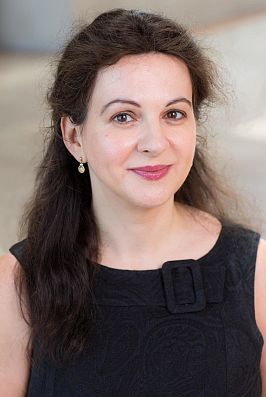Did you know speaking more than one language can help you age better? A new book released this week explores the research around multilingualism.
How does speaking multiple languages affect the mind?
For decades, that question was pushed aside as researchers considered a “standard” brain to be one that knows only one language. But now, more than ever, that assumption is wildly inaccurate.
Today, the majority of the world’s population speaks at least two languages. In Europe, fully two-thirds of the population is bilingual or multilingual.
“There are a lot of people out there who are bilingual and multilingual,” says Moldovan-American psycholinguist Viorica Marian. “It would help to understand how that multilingual mind works, because very likely that's the future of humanity, especially if you consider artificial languages and other symbolic systems as languages.”
Professor Marian was one of the pioneers in the field of psycholinguistics and has been studying multilingual brains since the 1990s. In her new book “The Power of Language: Multilingualism, Self and Society” she explores the body of research surrounding multilingualism – including some of her own – explaining it in simple, understandable terms.
According to that research, the multilingual brain functions very differently from the “standard” monolingual brain when it comes to memory, decision-making, creativity, ageing and more.
“People who speak more than one language or dialect have different linguistic, cognitive, and neural architectures than people who speak only one language,” Marian writes in the book.
“For us to study the mind in this abstract way as if it's monolingual – just one language, one mind – is very much a missed opportunity and it gives us an inaccurate understanding of how the mind works,” she told Euronews Culture.
Here are five ways bilingual and multilingual brains work differently, which Marian describes in her book.
1. Multilinguals can have different personalities in different languages
People who are fluent in more than one language often describe feeling like different people in each of them, as distinct aspects of their personality come through stronger depending on which language is being used.
On tests that gauge what psychologists call the “Big Five” personality traits – Openness, Conscientiousness, Extraversion, Agreeableness and Neuroticism – multilingual people frequently scored differently in their native versus second languages.
For Marian, this phenomenon directly translated to her ability to write her book. The author, who grew up in Moldova speaking Romanian and Russian, said she couldn’t imagine writing “The Power of Language” in any other language than English, which she learned in school.
She writes: “Writing in English frees me from the constraints imposed by the gender roles associated with my native language, allowing me to be the thinker, writer, and scientist that women in many languages do not have the opportunity to be.”
“There is a professional aspect to it, of course, where I don’t have the vocabulary to talk about neuroscience and cognitive science in Romanian and Russian,” she told Euronews Culture. “But there is also this personal connection, where language functions as a vehicle for culture. And Romanian culture - and southeastern European culture in general - still has a ways to go when it comes to representation of women in science.”
2. A multilingual brain processes every language everywhere all the time
It used to be believed that different languages were stored in different parts of the brain and that each one would get “turned on” when it was actively being used. But research has shown that theory’s all wrong. A multilingual brain actually processes all languages in parallel, keeping them co-activated all the time.
“When your brain processes language, it's not one place in the brain that processes language,” Marian says. “It's a network that's spread across all areas of the brain.”
Because of that, bilingual brains have more pathways connecting different words, concepts and memories across different languages. Practically speaking, that means a French-English bilingual will see more similarities between unrelated words like nail and cloud, for example, than someone who just speaks English because the word for nail in French is clou.
It also means that if part of the brain is damaged, one language might be impacted more than another. Marian compares it to an orchestra that’s lost one instrument.
“If you damage one part of the brain, just like if you take out one musician from the orchestra, some pieces of music are affected more than others,” she said. “A piece that relies more on the violin will be affected more by the violinist not being there than the piece that relies on it less.”
3. Multilinguals are more creative and divergent thinking than monolinguals
Creativity essentially boils down to your brain making connections between seemingly unrelated things. That’s how inspiration arises for art, music, writing and even creative problem-solving.
Because a multilingual person has more of these connections hard-wired into their brain through different languages and cultures, they tend to perform better on many creativity and divergent thinking tasks.
“The constant co‐activation of multiple languages strengthens the links between the sounds, letters, and words in a bilingual’s mind, which results in denser networks and stronger connections at the levels of concepts and meaning,” Marian writes.
Learning another language could even make you more creative, according to Marian. But don’t expect miracles.
She writes that “while learning another language will not take your creativity from zero to a hundred, it can help increase it from none to some, from some to more, and can give you the extra edge you need if you are already in a creative profession.”
4. Memories are stored and recalled differently in a bilingual or multilingual mind
The theory of Language-Dependent Memory suggests that memories are more easily accessed if they’re recalled in the same language the original event took place in.
For example, if a Mandarin-English bilingual is telling you the story of their life in English, they’ll more likely focus on things that happened to them in English. Whereas if they’re speaking Mandarin, the opposite would happen.
“Different neural networks get activated across languages, and with that activation, different memories come to mind,” Marian says. “So language sort of shifts because it’s so tied to culture and memory and personal experiences.”
It comes across in academia as well. For instance, if a Spanish-English bilingual is tested in English about something they learned in Spanish, they’ll perform worse than if the language of learning matches the language of the test.
Using a language that you haven’t used in a while can even spark a flood of memories that you thought you’d forgotten about.
5. Learning a different language can help your brain age better
Speaking different languages requires the brain to use a lot of energy, which in the long run can protect it from some forms of cognitive decline.
Research has shown that older adults who know more than one language have better memories, and population studies have found that multilingual countries have fewer cases of Alzheimer’s.
Another study found that knowing more than one language can actually delay Alzheimer’s and other types of dementia by four to six years on average. And the good news is that once you know a language, you don’t even need to use it regularly to reap the cognitive benefits.
“It is a good way if you are thinking about skills or ways to invest your time, learning another language can be a really useful one that can pay long term dividends as we age,” Marian says.
If you want to read more about multilingualism and its effects on the brain and society, pick up Viorica Marian’s book “The Power of Language,” which was released (in English) on 4 April by Penguin Random House.













